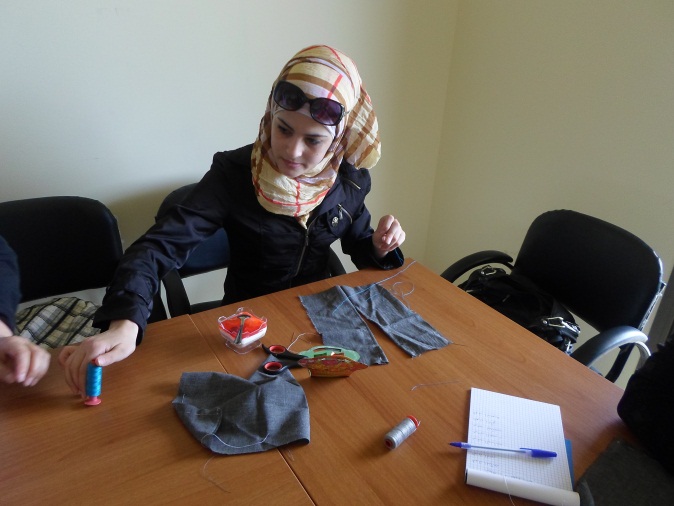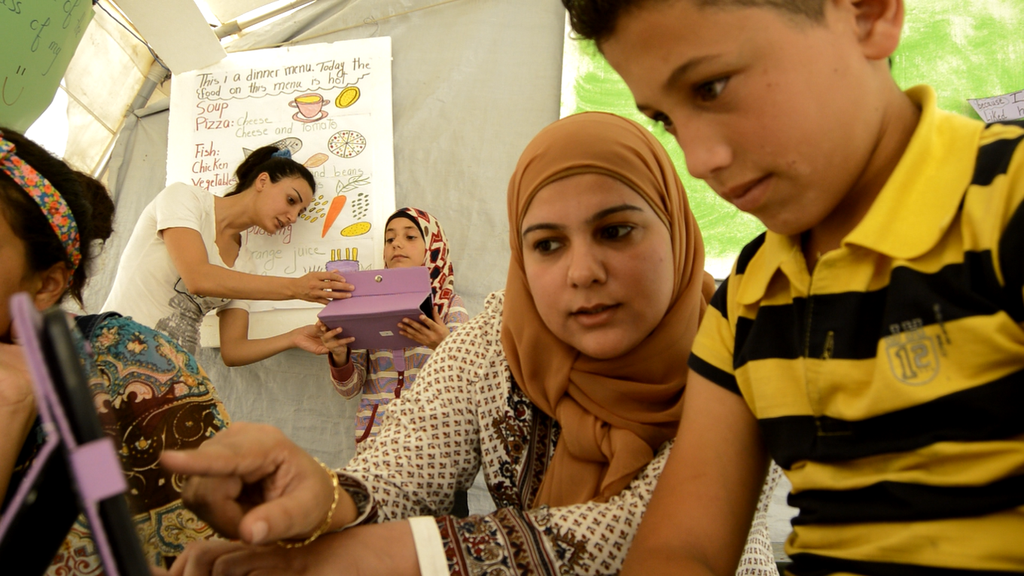New initiatives-and financing-from the EU bank for migrants and refugees

- Youssra Nawasra
Growing up in Deraa, Syria, Youssra Nawasra always wanted to be a fashion designer. Then the civil war broke out. When she arrived in Lebanon as a refugee, her plans seemed like a distant dream, until she took a training class with a local non-profit called Al Majmoua. Courses in sewing, business management and finance led to a job as a seamstress and she now is thinking of starting her own business with a small loan from Al Majmoua, which has twice received financing from the European Investment Bank. “A new window opened up in my life,” says Youssra, “and there was light again.”
The root causes of the current migration crisis are complex and global. But millions of ordinary people like Youssra have seen their lives fall apart. How the EU can respond to the plight of people like Youssra will be a key focus for EIB President Werner Hoyer at the United Nations Summit for Refugees and Migrants in New York this week. He will lay out how the EU Bank and its partner Development Banks and International Financial Institutions can help cope with the refugee crisis and the longer term challenge of migration. He will be setting out the EIB’s new Economic Resilience Initiative, which is now ready to go.
Migration crisis and the EU bank
The EIB is currently working on a series of new initiatives combined with existing programmes to help give communities in regions troubled by poverty, climate change, and violent conflict a real chance of building a settled and sustainable existence as close to home as possible.
War is the most obvious reason people become refugees. But poverty and the impact of climate change are two important factors that drive people to leave their homes in search of a better life elsewhere. The EIB has just announced a EUR 800 million initiative to increase investment in the most fragile and vulnerable areas of Africa, including the Sahel region just below the Sahara, around Lake Chad and in the Horn of Africa. The scheme will provide an essential alternative to “life threatening journeys and uncertainty in Europe,” President Hoyer said.
“When people can look forward to a dignified and peaceful life in their own countries and are protected from conflicts and natural disasters, they have every incentive to build their future where they really feel at home.”
EIB President, Werner Hoyer
Projects to improve water and sanitation in cities on the edge of the Sahara, energy supply to remote rural areas in East Africa, and financial security for vulnerable smallholder farmers are have already been identified, as have measures to strengthen the role of public banks in the Horn of Africa.

- An EIB investment helped back ITWorx's school for Syrian refugees in Lebanon's Bekaa Valley
Resilience and the migration crisis
The origins of the current refugee crisis lie in violent conflicts beyond the borders of Europe. The EIB aims to invest in the communities and people affected, to create opportunities for those fleeing to nearby countries to escape violence and persecution. The idea is that, when peace comes, it will be easier for them to return to their homes.
This is the idea that lies at the heart of our Economic Resilience Initiative. Focused on the Western Balkans and Europe’s Southern Neighbourhood, which covers North Africa and the Middle East, the initiative would substantially increase EIB financing in these regions: a new EUR 6 billion in addition to the EUR 7.5 billion already planned.
It will combine support for the private sector, particularly for young people and women, with more investment in socially important sectors like water, health and education. The Bank estimates this additional financing would trigger around EUR 15 billion in additional investments from 2016 to 2020, taking the total EIB mobilisation of investment in the regions to some EUR 35 billion.
The initiative aims to ease the pressure on those countries hosting huge numbers of refugees, and to provide more opportunities for those driven from their homes by investing even more in the overall development of these economies.
Support for individuals
As Youssra Nawasra’s story shows, EIB support can touch individual lives in a very direct way. Supported by EU grants, the EIB’s first microfinance operation in Jordan was with Microfund for Women, which provides microloans and training to help low-income women, both native Jordanians and now Syrian refugees, to start small businesses, provide for their families and regain confidence.
An online education company ITWorx, owned by EIB-backed EuroMena Fund, set up a school in a camp for Syrian refugees in Lebanon. Children who haven’t been able to attend school for years, now study a cloud-based version of the Lebanese curriculum on $60-tablets with the aid of only a couple of teachers. ITWorx’s initiative is aimed at rebuilding the future of those who fled the civil war in their homeland. “You can fight the refugee problem politically,” says Romen Mathieu, ITWorx chairman. “But the best way to fight is with culture and investments—by creating hope in the region.”
Silicon Badia Impact Fund also benefited from EIB backing. The Jordan-based fund provides mentorship, expertise and finance to young people designing tech products and solutions to tackle the region’s numerous problems. Managing Director Emile Cubeisy describes the business environment in which the fund operates as “a golden era of entrepreneurship born from very difficult circumstances.”
The EIB is committed to boosting the resilience of economies and individuals across the regions affected by migration and forced displacement. Our support will mean that as many people as possible will be able to live a dignified and peaceful life at home. It should also mean that those who do need to move will not have to travel too far and will be able build skills which will be useful on their return. Above all, our support should bring the light back into people’s lives, the way it did for Youssra.